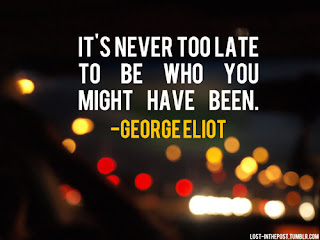
As often happens when I am mulling something over, I have been reminded of a some songs that present divergent views about the results of looking back over one's life. One of those is Frank Sinatra's classic "I Did it My Way." This song presents the thoughts of someone facing "the final curtain" and thinking about how well he did. His self-assessment is that he was someone who planned his life, lived it according to his own rules, did things his own way, always stood tall, and, although he has regrets, they are "too few to mention." Hmmm. Pretty impressive record.
Another song that tells the story of a man looking back over his life is Harry Chapin's "Cat's in the Cradle." When I was a young man, it was one of my favorites, but these days I find its message so disturbing that I usually avoid it. But I listened to it today, and was struck again by the fatalistic view of his life the man unfolds. The story begins when he is young man, busy with his career. His son is born, but the young man is busy pursuing what is most important to him, and time goes by faster than he expects it to. Now he is old, and looking back on his life, and wants to spend time with the son he neglected. Only now the son is too busy for him. The little boy's wish to be "just like him" has come true, but that fact is portrayed as a curse, as the tendency of some men to value the wrong things, to make the wrong choices until it is too late, and to pass that failure along to their sons. In other words, instead of giving himself on all A's on Life's Big Report Card
 like the man in the Frank Sinatra song does, Harry Chapin's fellow gives himself nothing but F's. And, oh, by the way, his son will fail at life, too, and there nothing he can do to make any of it any better. He and his son were both failures before they even started out. Let's all just kill ourselves now.
like the man in the Frank Sinatra song does, Harry Chapin's fellow gives himself nothing but F's. And, oh, by the way, his son will fail at life, too, and there nothing he can do to make any of it any better. He and his son were both failures before they even started out. Let's all just kill ourselves now. I think both of these views are unfair and dishonest. I don't think anyone who has learned anything in life can look back and honestly say they have no regrets. And I also don't believe anyone is ever a complete failure, or that there is ever a time when it is impossible to rectify past mistakes, perhaps by making the future better. Some people are afraid to admit that they might have done some things better, that they should have made different decisions. Others are too hard on their younger selves, forgetting that when they made whatever mistakes they condemn themselves for, they had not yet gained the experience and wisdom that now allows them to see where they erred.
As I look back on my own life, in general I think I have done pretty well. The biggest regrets I have are the times when I have treated people unkindly. There are things I might do differently, given the chance. I sometimes wish I had been a lot less serious and goal-oriented in my youth, that I had taken time to have more fun. I also wish I had been more willing to take risks, to make changes and try things that were a bit scary. But I don't condemn myself for not making those choices. For the most part, I did the best I could in most situations, and I don't have any huge regrets or failures to be ashamed of.
 Some people I know that are my age do have major regrets. When they talk about their pasts, some express shame, some grow wistful, wishing things had been different. "For all sad words of tongue or pen, the saddest are these: it might have been." -- John Greenleaf Whittier. To those folks I say, there is still tomorrow.
Some people I know that are my age do have major regrets. When they talk about their pasts, some express shame, some grow wistful, wishing things had been different. "For all sad words of tongue or pen, the saddest are these: it might have been." -- John Greenleaf Whittier. To those folks I say, there is still tomorrow.While it is true that getting older and honestly assessing our lives are not for sissies, it also true that facing our regrets and learning what we can from them makes it possible to make our futures better, to look forward to doing things differently, and perhaps doing the things we always wanted to, but never got around to.
More about looking forward in my next blog.
Copyright © 2013 by Steven W. Fouse






















